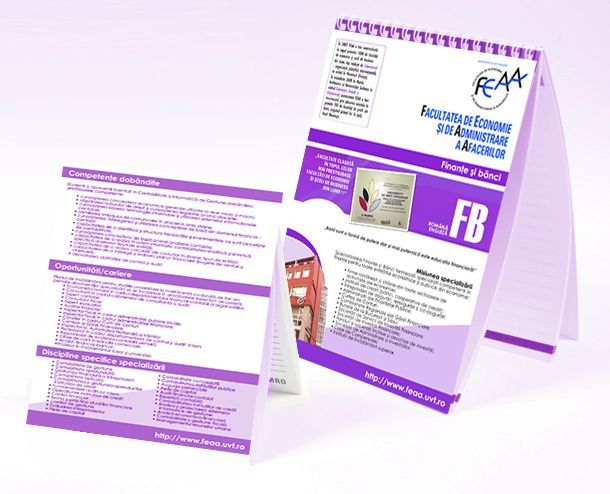Finanțe și Bănci - limba Engleză
Presentation
Finance and Banking (in English) undergraduate programme
The profile of the study programme
How do companies behave? How do financial markets work? How does the financial sector interact with the other components of the economy?
This study programme enables you to understand the way in which the financial sector works and helps you build a career in this domain, as financial and credit institutions play a great role not only in the world economy, but also as one of the most important employers on the market. The Finance and Banking study programme has been created as a direct answer to the continuously growing need for professionals, who, through their training and experience can help companies, regardless of their size, be successful on a global market. By attending this programme you will learn and analyze the way in which companies obtain and handle their capitals, the founding and implementing of financial strategies in the public and private sector, which monitor and control the financial flows and the use of financial instruments, the economic conditions that influence them and many others. The skills you will acquire will allow you to continue your professional training by attending a master’s programme in the domain of finance.
The practical components
The Finance and Banking undergraduate programme ensures a high level of professional training, by offering the necessary knowledge in order to master quantitative, statistical and financial methods and techniques in the domain of enterprise asset management, efficiency, effectiveness and risks at enterprise level, skill development in the domain of financial investments, the usage of techniques and instruments which are specific for credit and financial institutions, for insurance societies, knowing the instruments of monetary policy (state budget, public income and expenditure), mastering the taxation techniques.
The four platforms installed within the Trading Floor give you the possibility to put into practice the information gathered throughout the second and third year of studies, for certain subjects. At the end of the second year the mandatory one month long internship stage inside enterprises, financial and credit institutions, insurance societies and public institutions contributes to the consolidation of the acquired knowledge.
Professional opportunities
The Finance and Banking undergraduate programme aims at forming students that are capable of:
- Understanding the fundamental elements and the particularities of the financial domain and of the multidisciplinary decision making model and offering relevant solutions for the business environment, for the professional and public communities they are a part of. Based on their training, the future graduates of the Finance and Banking programme will be able to work in the financial departments of national and transnational enterprises, the financial departments of public institutions, credit institutions, service societies for financial investments (SSIF), financial investments societies (SIF), investment funds, stock exchange, financial consultancy societies, investments management societies, insurance societies, leasing societies, the National Commission for Securities, the National Bank of Romania (BNR), etc. You can also choose a career as inspector/consultancy specialist/economist, inspector/bank/leasing society consultant, credit officer, customer service consultant, financial analyst, investments analyst/consultants, service agent for financial investments, dealer, risk manager, taxation inspector, financial guard commissary, border inspector etc.
- Becoming professionals who are capable of generating innovative solutions, implementing the results of their studies regarding the business environment and disseminate them for the purpose of economical development based upon knowledge. Our graduates can easily integrate in the pre-university and university systems both national and from abroad and also in different research institutes.
I. General Skills:
1. Knowledge skills:
- To master the economic, financial and banking vocabulary in order to be able to communicate in writing and orally, including the use of an international language;
- Ability to use tools, methods and techniques derived from statistics and econometrics, and the ones specific to the field of finance;
- Ability to generate, process and manage information in the financial-banking field;
- Usage of operational methods and techniques specific to the field of finance.
2. Action-functional skills:
- Participate to team-assignments in order to achieve programs specific to the financial field.
II. Financial Skills:
1. Expertise:
- Ability to effectively use methods and techniques specific to financial institutions, banks, insurance companies and capital markets entities;
- Ability to perform / execute operations and activities specific to financial institutions, banks, insurance companies, capital markets entities;
- Perform activities within the departments of the budget, treasury, audit, analysis and evaluation of the companies and financial-banking institutions;
- Skills to provide financial investment services on the capital markets.
2. Specific cognitive skills:
- Understand and carry out financial management decisions in the public and private entities;
- Ability to integrate in teams performing financial audit and control;
- Participation in team-work to design and perform programs specific to the financial-banking sector;
- Appling fundamental concepts, theories and methods of investigation specific to the field of study in order to express professional initiative;
- Ability to synthesize and interpret a set of information, to solve fundamental and complex problems, to valuate the possible conclusions ;
- Independent analysis of issues and ability to communicate and demonstrate the solutions chosen;
- Show initiative in analyzing and solving problems;
- Understand and apply financial management decisions;
- Ability to use the IT equipment for specialized financial and banking projects.
3. Professional skills:
- Ability to understand the task;
- Customizing and particularizing between abstract and general;
- Training and experience.
- Accuracy in thinking;
- Spirit of order and discipline;
- Timeliness, consistency and determination in performing the profession.
- Oferta educațională FEAA
- Programe de Licență
- Contabilitate și Informatică de Gestiune
- Economia Comerțului Turismului și Serviciilor
- Economie Generală și Comunicare Economică
- Economie și Afaceri Internaționale
- Finanțe și Bănci
- Finanțe și Bănci - limba Engleză
- Informatică Economică
- Management
- Management - limba Franceză
- Marketing
- Rechnungswesen und Wirtschaftsinformatik
- Programe de Masterat
- Romanian-British MBA
- Programe postuniversitare
- Programe de Doctorat
- Programe Învățământ la Distanță (ID)




